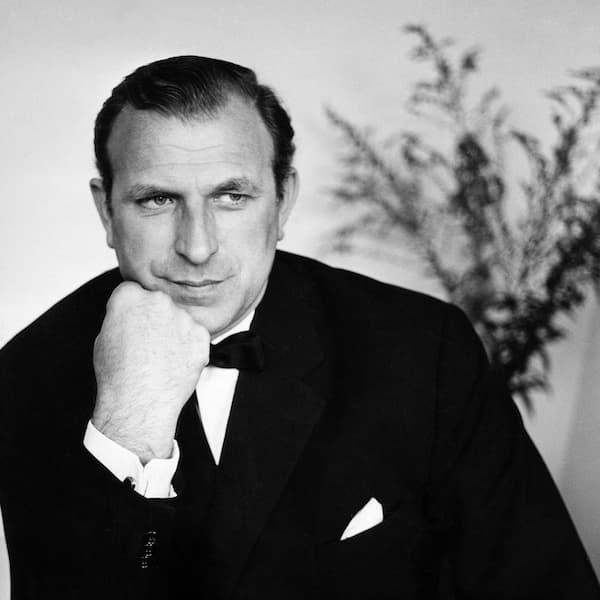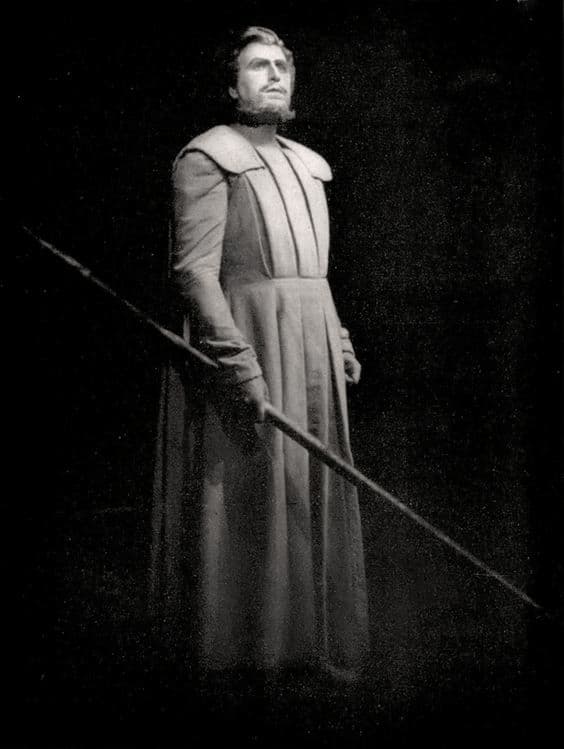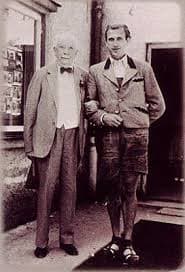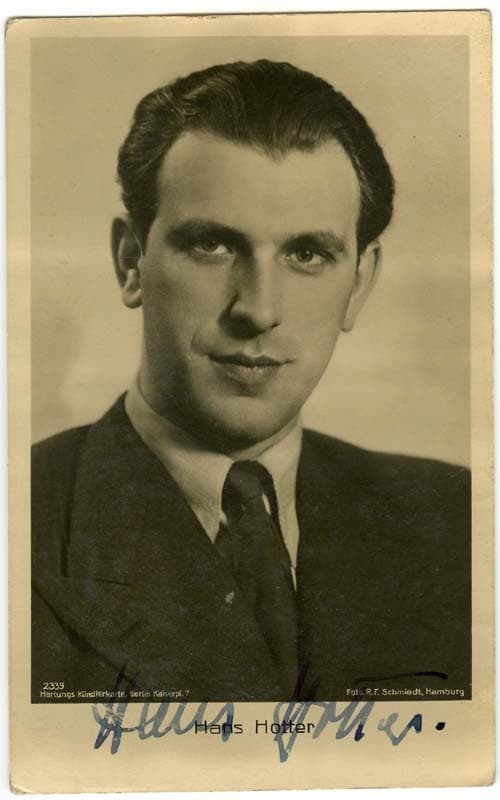Hans Hotter was a celebrated German bass-baritone known for his commanding presence and powerful voice in opera, particularly in Wagnerian roles like Wotan. Born on 19 January 1909, he debuted in 1930 and gained international fame post-WWII. He was also renowned for his interpretations of German lieders.

Hans Hotter
Hotter performed at major opera houses worldwide, contributed to premieres by Richard Strauss, and after retiring in 1972, he taught at the Vienna Music Academy. To commemorate his birthday on 19 January, we decided to feature some of his greatest recordings.
Hotter/Knappertsbusch Perform Wagner’s Die Walküre, “Wotan’s Farewell” (1956)
Wagner “Wotan”

Hans Hotter as Wotan in Wagner’s Die Walküre, 1955
Hans Hotter’s performances in Wagner’s Ring Cycle are among his most celebrated achievements, particularly his portrayal of Wotan, the king of the gods. Hotter’s deep, commanding bass-baritone voice and his powerful, nuanced interpretation of the role earned him widespread acclaim throughout his career.
He first performed the role of Wotan in the early 1950s, and his portrayal became a defining one in the Ring traditions. His Wotan was marked by a combination of vocal richness and intellectual depth, perfectly capturing the character’s complex inner struggles and tragic dignity.
Hotter’s voice, though large and powerful, was noted for its beauty and flexibility. He was capable of producing both imposing, thunderous sounds and moments of subtle delicacy. His articulation and diction were also exemplary, allowing him to convey Wagner’s often complex text with clarity and emotional resonance.
Hotter/Sawallisch Perform Strauss’ Capriccio, “Holà! Ihr Streiter in Apoll!” (1957)
Strauss “Capriccio”

Richard Strauss and Hans Hotter
Hotter brought his natural musicality, trademark vocal elegance and dramatic clarity to a number of roles by Richard Strauss. His rich, warm bass-baritone was well-suited to the vocal demand of Strauss’ music, which requires a singer with lyricism, vocal beauty, and the ability to navigate the composer’s intricate and often delicate orchestration.
Hotter first performed the part of “La Roche” in Capriccio during the 1950s and continued to perform it into the 1960s. Capriccio is full of complex harmonies and expressive moments that demand not only vocal skill but also a fine sense of musicality and character, both of which Hotter delivered.
His performance in Capriccio showcased his versatility as a singer and his ability to master the nuances of a highly demanding repertoire. He brought out the underlying complexity of the character and underscored his impressive ability to adapt to different styles and genres within the operatic world.
Hotter/Altmann Perform Schumann’s Dichterliebe (1954)
Schumann “Dichterliebe”

Hans Hotter
Hans Hotter was strikingly suited for the operatic stage. However, his true love of singing found perfect expression in his Lieder interpretations. In spite of his enormous voice, he was uniquely able to condense his vocal intensity into a velvety and almost delicate timbre, expressing the meaning and feelings of the words without ever sacrificing the melody.
Hotter’s performance of Schumann’s song cycle “Dichterliebe” is celebrated for its profound emotional depth and interpretative insights. He had the ability to make each song a distinct narrative part of the whole cycle, giving listeners a sense of the protagonist’s psychological journey. His performance has been described as both intellectually engaging and deeply moving, showcasing the full spectrum of human emotion depicted in Heine’s poetry and Schumann’s music.
Schubert “Winterreise”
Hotter’s interpretation of Schubert’s Winterreise is considered one of the most profound and influential renditions of the iconic song cycle. He brought an unbelievable level of emotional depth and vocal authority to the lieder repertoire, particularly to Winterreise, a cycle that explores themes of isolation, despair, and the inexorable passage of time.
Hotter’s deep, sonorous tone brought a darker, more brooding dimension to the work. He portrayed the journey of the protagonist as an existential and deeply emotional one, with a focus on the psychological toll of the journey. In particular, he highlighted the inner turmoil of the “wanderer” and the sense of overwhelming loss and desolation.
One of the most striking aspects of Hotter’s performance was his ability to make Winterreise feel intensely personal. Unlike some performances, which could be seen as more analytical or technical, Hotter’s rendition gave the impression that the journey was not merely an artistic portrayal but a lived experience.
For more of the best in classical music, sign up for our E-Newsletter
